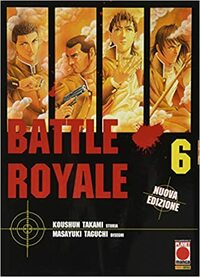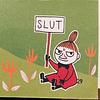Take a photo of a barcode or cover
The premise is doing some serious heavylifting in this one. The dialogue is straight up garbage (could be the translation, but I don't think translation alone could mess it up this badly if it were any good). The villains are shallow. The protagonist has literally nothing going for him except the power of friendship. And half of these kids half no sense of self-preservation.
dark
Actually got bored somewhere in the middle, but it all picked up again in the end. Lots of things I need to think about (mostly personal preferences, though; I don't really like motivations to be romantic love and stuff like that, but I do like Kawada despite all that), but definitely a good enough read. I didn't like the movies too much, but I'm glad I picked this up and got a chance to meet a more fleshed out Nanahara.
I still can't decide whether I love this book or hate it.
I mean, I love the way it is written, and the characters are thought-provoking and complex. But at the exact same time, I HATED it.
I think it's because the book messes with your head. It starts to make you unsympathetic to these 13 and 14 year olds killing each other in unimaginably cruel ways. You care only about what happens to the three main characters. And that's messed up. Everything "The Hunger Games" is presented as by the media, this book is, but tenfold, and 6 years earlier.
Overall, this book is extremely interesting, but incredibly fucked up in so many ways. I don't know if I would recommend it or not.
I mean, I love the way it is written, and the characters are thought-provoking and complex. But at the exact same time, I HATED it.
I think it's because the book messes with your head. It starts to make you unsympathetic to these 13 and 14 year olds killing each other in unimaginably cruel ways. You care only about what happens to the three main characters. And that's messed up. Everything "The Hunger Games" is presented as by the media, this book is, but tenfold, and 6 years earlier.
Overall, this book is extremely interesting, but incredibly fucked up in so many ways. I don't know if I would recommend it or not.
Definitely an interesting read. I would have liked to see more of a focus on people. Takami did really work at it, but the number of students was really high, so there are very few students we get to know.
I read the graphic novel a long time before I read the book. I'm not quite sure which I enjoy more, since I like both of them for different reasons. The graphic novel seems to go more in depth with many of the characters, but the book is already so vivid and attention grabbing that it doesn't matter.
You'd think that when your life's at stake not everything would be about who you crushed on in class...But aside from a few lacklustre main characters, it was raw, real, and truthfully painful in the ways most YA dystopias never are.
Would have liked to see more of Kazuo's perspective as a psychopath, since he was initially one of my favourites to begin with but later seemed to only become a tool for reducing character counts. Wasn't a fan of the fairly shallow female perspectives or the focus on class romance (what about family?? Friends??). Didn't think Shogo should have died, Shuya and Nariko were weakly written.
This is written three years after I finished the book, when suddenly my love for Battle Royale and my hate for The Hunger Games were rekindled for no reason.
I read somewhere that Suzanne Collins never heard of Battle Royale before writing The Hunger Games and I absolutely believe her.
Because if she had read the former, she would have known her stuff were garbage and would never have published them.
I read somewhere that Suzanne Collins never heard of Battle Royale before writing The Hunger Games and I absolutely believe her.
Because if she had read the former, she would have known her stuff were garbage and would never have published them.
This was recommended by Val.
It was a good read. I'd heard comparisons to Lord of the Flies and/or 1984. Despite the content, this was actually a more optimistic book than either of those. The totalitarian government isn't as all-power as the one in 1984 and the children actually acquit themselves better. Most of them actually try to avoid taking part in the game, even though it will mean their deaths. Only a small handful actively participate (and two of those are basically insane). A few people lose it, but only 3 or 4 kids are actively evil.
(I suspect the author wrote this during his "young people are awesome/don't trust people over 30" phase of his life)
What I didn't like: the main antagonist amongst the kids, Kazuo, seems like some weird version of a Mary Sue for villains. He inexplicable survives a massive explosion unharmed and is otherwise indestructible. He always knows what the other students are planning or attempting. He also pulls random skills out of his ass as needed. FIghting the class martial arts expert? Oh guess what? He's ALSO a master at martial arts!
I found that it really diminished the dramatic tension in the scenes involving him. The other students were so pathetically outmatched (including the ones who seemed like they should have stood a chance) that his scenes were annoying. It seemed like a copout on the part of the writer. I wish he'd tried to portray Kazuo as more cunning instead of simply giving him a million hit points and the magic ability to know what the other people were trying to do.
On the bright side, I was expecting a miserable, unhappy ending, but it wasn't too bad after all. Possibly it was a bit Hollywood.
It was a good read. I'd heard comparisons to Lord of the Flies and/or 1984. Despite the content, this was actually a more optimistic book than either of those. The totalitarian government isn't as all-power as the one in 1984 and the children actually acquit themselves better. Most of them actually try to avoid taking part in the game, even though it will mean their deaths. Only a small handful actively participate (and two of those are basically insane). A few people lose it, but only 3 or 4 kids are actively evil.
(I suspect the author wrote this during his "young people are awesome/don't trust people over 30" phase of his life)
What I didn't like: the main antagonist amongst the kids, Kazuo, seems like some weird version of a Mary Sue for villains. He inexplicable survives a massive explosion unharmed and is otherwise indestructible. He always knows what the other students are planning or attempting. He also pulls random skills out of his ass as needed. FIghting the class martial arts expert? Oh guess what? He's ALSO a master at martial arts!
I found that it really diminished the dramatic tension in the scenes involving him. The other students were so pathetically outmatched (including the ones who seemed like they should have stood a chance) that his scenes were annoying. It seemed like a copout on the part of the writer. I wish he'd tried to portray Kazuo as more cunning instead of simply giving him a million hit points and the magic ability to know what the other people were trying to do.
On the bright side, I was expecting a miserable, unhappy ending, but it wasn't too bad after all. Possibly it was a bit Hollywood.





